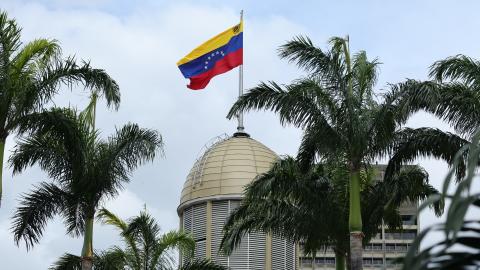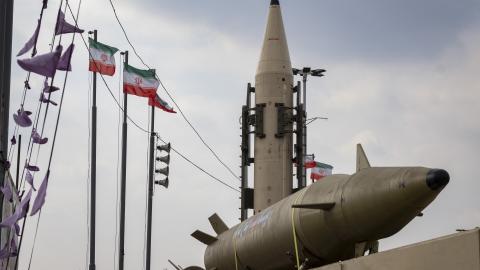The process of drafting Iraq's constitution has been chaotic, as evidenced in the confusing and contradictory final (so far) document. It is neither a template for an Islamist state nor a blueprint for a constitutional democracy. But depending on how the Iraqis handle it, it has elements that could be made to fit either.
The constitutional proposal was due August 15, but at the last minute the drafting commission requested a seven-day extension. When August 22 arrived, the Sunni participants still objected to the draft. A myriad of formal and informal negotiations followed between party and faction leaders, while commission and Parliament members complained they were sidelined. Differing drafts and fragments of drafts circulated around Baghdad and elsewhere while American pundits interpreted their meaning, often without knowing whether the draft they had was an accurate or even recent version.
U.S. Ambassador to Iraq Zalmay Khalilzad had many sleepless nights as he pushed negotiators to find some compromise. At one point, even President Bush weighed in by phone. Amendments were being drafted until August 28, when finally a draft was submitted to the Parliament and approved by the country's political leadership. This version is being submitted to the country for an October 15 referendum.
Convention amid Conflict
Before criticizing the Iraqi negotiators, it is important to realize how difficult their life has been. They had to draft a charter for a country with no robust institutions capable of forming a stable framework for the new regime. Several of Iraq's neighbors worked to make them fail, and bitter internal ethnic and religious divisions, as well as radically differing visions compete for the country's future. Among the major items on the commission's agenda, apart from creating a whole new government, have been federalism (especially regarding the Kurds in the north), the division of oil revenues, and the relation of Islam to the law. They have had to do all this in a matter of months, before the critical eyes of a watching world.
Outside the commission's heavily protected meetings, more than 150,000 foreign troops have been battling with an unseen enemy that murders many more Iraqis than Americans. Abu Musab al-Zarqawi's terrorist organization "Al Qaeda in Iraq" has again announced that all constitutional drafters are defying God by trying to make man-made laws instead of following Islamic law, Shari'ah. Zarqawi's "judicial court" ruled that "it is a duty to uphold God's law and kill those who have declared themselves God's partners in drafting this void constitution. All those who write and support this constitution are apostates." Two of the drafters have already been killed by terrorists.
In comparison, the United States did not finalize its constitution until a decade after declaring independence. Though built on strong institutions and existing state constitutions, along with national consensus on most core issues, the U.S. Constitution was not accepted until the drafters agreed to add the Bill of Rights' ten amendments after ratification. The issue of slavery was deferred in order to get the acquiescence of the Southern states. It would come into force if only nine of the thirteen states accepted it. When George Washington was inaugurated for the first time in April 1789, Rhode Island and North Carolina were still outside the fold.
'A Fundamental Source'
Understanding what the Iraqis have produced requires a close reading of dense texts. Article 2 states that "Islam is the official religion of the state." This in itself need not create problems. Many states, including established democracies in Europe, have state religions, and the practice is not held to be in violation of international human-rights standards.
However, the same article says that Islam "is a fundamental source of legislation." But which version of Islam will be treated as a source, and who gets to say here what Islam is and what it requires? Will it be unelected Shiite or Sunni clerics?
Concern over this clause is tempered by the description of Islam as a, not the, source of legislation, which means that there will be other sources that could counterbalance an undefined Islam. Article 5, for example, says, "The people are the source of authority." But Islam is not only a source but a fundamental one, so its powers could be strong.
Similar concerns arise with Article 2's further requirement that "no law may be enacted that contradicts the established provisions of Islam." Here it is important to note that there may be a difference between a law that contradicts Islam per se and one that contradicts its "established provisions." The implication is that such provisions would require virtual unanimity; this may be a check on some excesses.
A more important check is that Article 2 goes on immediately to add, "No law may be enacted that contradicts the principles of democracy" and "No law may be enacted that contradicts the rights and basic freedoms stipulated in this constitution." This combined theme that nothing should contradict Islam or democracy or guarantees of rights and freedoms reiterates the balancing pattern of Iraq's Transitional Administrative Law (TAL), the interim constitution passed under American occupation. While the current draft is weaker than the TAL, it could provide similar protections.
More worrying is yet another provision in Article 2: "This constitution shall guarantee the Islamic identity of the majority of the Iraqi people and shall guarantee the full religious rights of all individuals in the freedom of belief and religious practice to the followers of the Christian, Yazidis, and Mandi Sabean religions." This has three problems. First, it excludes some religious groups, such as Baha'is and Jews. Second, it is not clear what "freedom of belief and religious practice" actually protects. It might mean only freedom to hold your beliefs and to have private worship servicesa far cry from full religious freedom. Every religion calls for far more than beliefs and liturgy, including freely living out its beliefs in the society at large.
The meaning of the unusual and worrying provision guaranteeing "the Islamic identity of the majority of the Iraqi people" is not at all clear. It is a vague constitutional mandate of potentially unlimited scope.
Another concern is Article 39, dealing with personal statusmarriage, custody, alimony, and inheritance: "Iraqis are free in the adherence to their personal status according to their own religion, sect, belief, and choice, and that will be organized by law." Most discussion of this has focused on its potential to undercut women's rights, but its effects can be far wider: People could be forced into a legal status dictated by a religious group whether they wanted to or not, and their individual religious freedom could be undercut, especially since many interpretations of Shari'ah give one set of rights for Muslim men, another for Muslim women, and quite another for non-Muslims. These provisions can further reinforce the second-class status of Iraq's already beleaguered Christian community, now roughly 3 percent of the population and rapidly shrinking.
This contradictory draft constitution provokes many cans, coulds, and other concerns. Its clauses might be used either to bolster or to limit religious freedom. Since the Iraqis are continually adapting the document, the United States should discreetly push particularly for changes in Article 39 and the "Islamic identity" provisions in Article 2. If the constitution is accepted in the October referendum, the other worrying clauses could become much less worrisome in the hands of capable judges who reinforce the document's human-rights guarantees. In this, as in so much else, the major effect of the constitution is going to depend on the quality of the government that enforces it.














